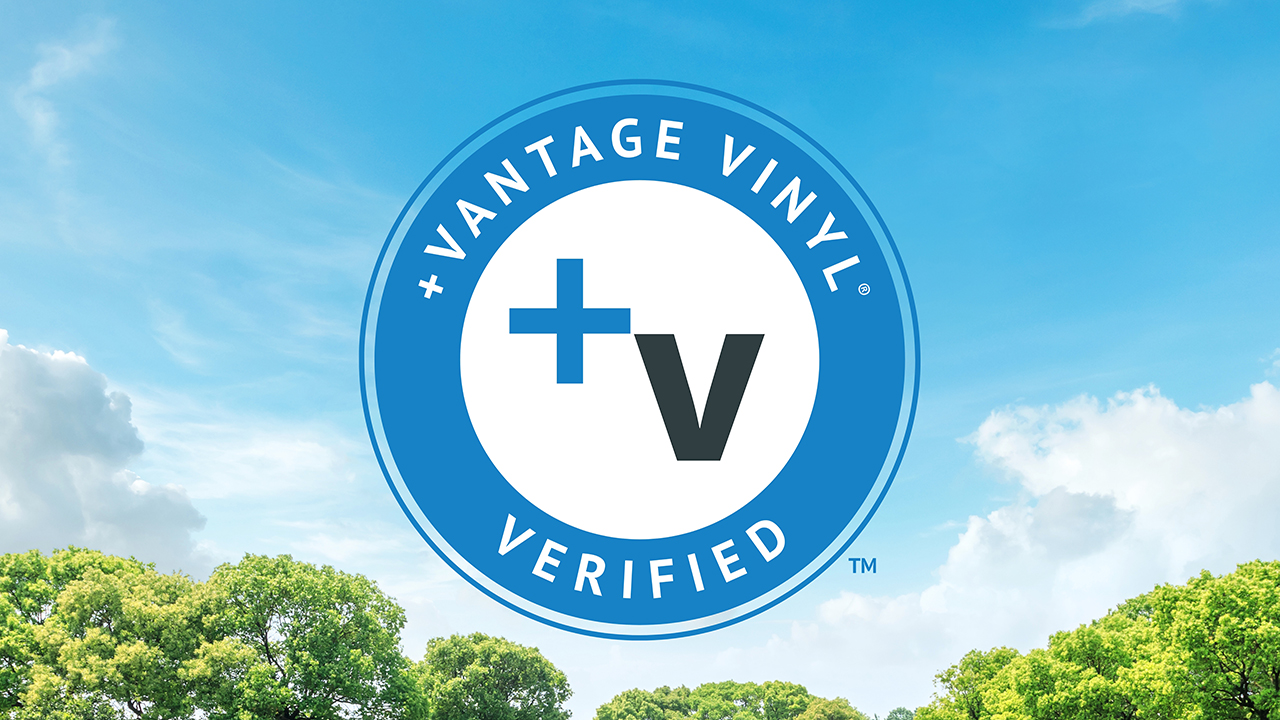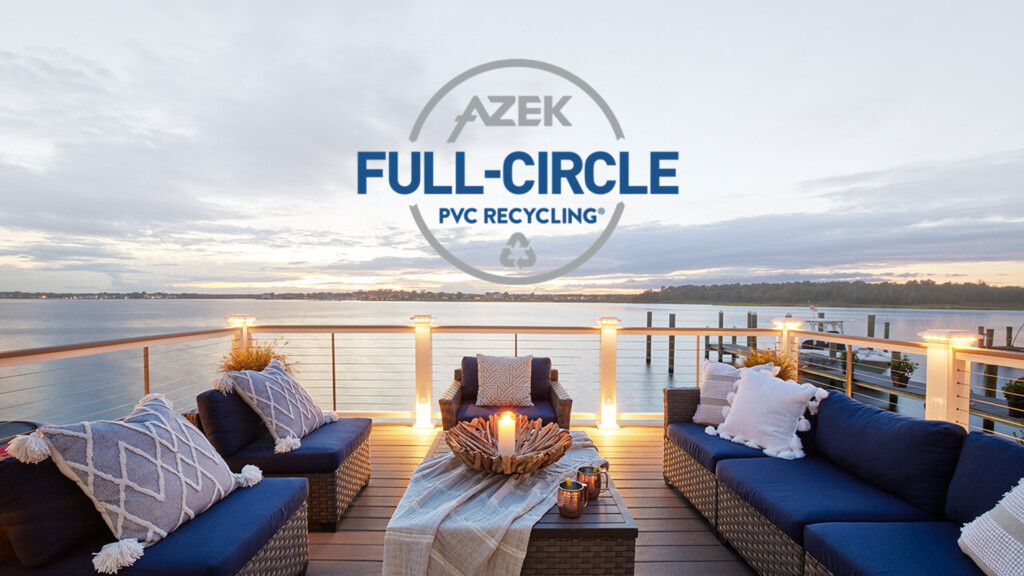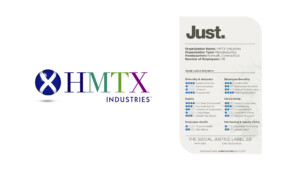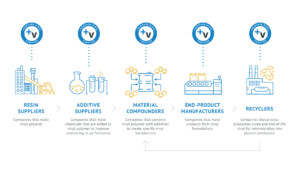
PVC Products: Driving Sustainability for Designers and Architects
Industry Efforts are Paving the Way
Over the past several decades, key players in the vinyl industry have made meaningful, sizable advances in sustainability, translating into new, more sustainable solutions for the building and construction industry. Such advances provide much-needed benefits to almost every industry stakeholder in building and construction – designers, architects, specifiers, building owners, and building occupants. This is particularly the case when it comes to the selection of materials for everything from exterior cladding and windows to flooring and other critical building components. Now more than ever, construction professionals are under added scrutiny when it comes to how the materials they select will impact the overall carbon footprint of a building and how those materials affect the structure’s sustainability credentials in general.
The production, transportation, installation, and use of all building materials, including vinyl, create environmental impacts. Mitigating those impacts is a journey of continuous improvement.
The vinyl industry has created a roadmap called +Vantage Vinyl® to help companies navigate the journey of continuous improvement so that they may differentiate their own performance and exceed an industry baseline.
Members of the Vinyl Sustainability Council that have been +Vantage Vinyl verified via GreenCircle Certified are continuously driving sustainability initiatives in a variety of ways – by implementing closed-loop recycling programs, by advancing towards net-zero emissions, and by enhancing material health and transparency.
AZEK: Reshaping Recycling Initiatives

As a manufacturer of outdoor living solutions, AZEK is dedicated to producing low-maintenance, eco-friendly products.
Recycling PVC is pivotal for a variety of reasons, from conserving resources, energy savings, economic benefits, and reduced environmental impact. As an innovative manufacturer of outdoor living products, AZEK is committed to creating low-maintenance, environmentally sustainable products. AZEK recognized a need for rigid PVC recycling, launching its FULL-CIRCLE Recycling™ program in 2020. What began as an effort to fill a singular, smaller tote bin for scrap cut-offs, has now transformed into a wide-scale recycling effort.
As part of this mission, AZEK transports bins to the jobsite. Crews collect scrap cutoffs of rigid PVC vinyl trim, siding, and deck boards and place them in the bin, and the bin is transported back to Return Polymers, AZEK’s in-house recycling facility. The reclaimed scrap is then recycled and used in the manufacturing of new products across AZEK’s portfolio.
HMTX: Just Labels, Social Justice, and Equity

HMTX became the first manufacturer in the world to achieve the JUST℠ 2.0 social transparency label, which aids organizations in optimizing policies and practices that improve social equity and enhance employee engagement.
In 2020, HMTX became the first manufacturer in the world to achieve the JUST℠ 2.0 social transparency label, which aids organizations in optimizing policies and practices that improve social equity and enhance employee engagement. Created by the International Living Future Institute (ILFI), the JUST label serves as a nutrition label for socially just and equitable organizations.
JUST gauges the depth and effectiveness of a company’s practices of social justice and equity in 22 indicators across six different categories: diversity and inclusion, equity, employee health, employee benefits, stewardship, and purchasing & supply chain. Companies need to have a policy in place and publicly available for an indicator to qualify for a Level 1 score for that indicator. Companies are further scored (Levels 2-4) based on the strength of the policy or data-driven factors.
“We’re proud of our ability to seek continuous improvement through the JUST label,” said Arthur Clarke, director of sustainability & impact, HMTX. “We first started working on the JUST label in 2018, and the process provided us with insights into what we can do better to bolster a better future.”
HMTX has used JUST as a roadmap to enhance or introduce policies related to social justice and equity, including a tuition assistance program and a volunteer-time off (VTO) program that were implemented in 2022. Through the VTO initiative, HMTX employees have the opportunity to volunteer at nonprofit organizations and lend their time to positively impact the quality of life within their communities.
Ultimately, verification for vinyl companies via +Vantage Vinyl means those enterprises have offered credible proof of their sustainability efforts, data points carefully scrutinized and confirmed by professionals that sit outside the company’s four walls.
The Path to Net Zero: Mannington Mills

Mannington reports GHG emissions per pound of product, aiming for net zero emissions by 2050. Mannington has partnered with Appalachian Carbon Exchange (ACE) with the goal of an estimated 392,000 metric tons of carbon-equivalent greenhouse gases will be offset in a five-year period.
Like companies in many other industries, vinyl manufacturers are striving for net zero emissions due to an increasing awareness of the environmental impact of their operations.
Companies such as Mannington Mills are paving the way by consistently reporting on GHG emission metrics and analyzing a path for improvement.
Mannington Mills takes a unique approach to measuring and reporting GHG emissions. Where a lot of companies measure GHG emissions based on a yearly production rate, Mannington takes the approach of using intensity metrics. Since production varies every year, Mannington reports GHG emissions per pound of product to report metrics more accurately.
Aiming for net zero emissions by 2050, Mannington has partnered with Appalachian Carbon Exchange (ACE) as its carbon offset partner. Through an initial five-year partnership, Mannington is committed to working with local and regionally based partners to invest in communities right in its own backyard. Mannington’s commercial flooring products are manufactured at facilities in Northwest Georgia, part of the area covered by ACE. An estimated 392,000 metric tons of carbon-equivalent greenhouse gases will be offset in this five-year period. These offsets will cover the equivalent of 105% of embodied carbon of Mannington’s commercial domestically manufactured flooring products.
With an ongoing commitment to environmental stewardship, Mannington became the first floor covering manufacturer to join Build Reuse, a premier national organization encouraging recovery and reuse of building materials throughout the United States. Through the partnership, Mannington customers can contact Build Reuse when projects require the removal of carpet products. Build Reuse then works directly with local market partners to determine the most environmentally responsible reuse for the recovered carpet.
“Our emissions touch every part of our company, from practices, production, and process improvement,” said Shane Totten, director of sustainability. “When people buy our products, they can rest assured we are working to reduce our emissions, and the impact of climate change in every way we can.”
Leading the Charge: Redefining the Vinyl Industry
As companies across the vinyl industry continue to make strides toward sustainability, key players are demonstrating success and bold steps toward a better future.
+Vantage Vinyl-verified companies continue to prove one thing: PVC has undergone a remarkable transformation, and it is not finished.
Closed-loop recycling, lowering emissions, and transparency are all at the center of the companies’ missions as they continue driving positive changes in the industry. As these initiatives gain momentum, not only do they benefit the environment, but they resonate across all sectors of the building and construction industry that influence material selection.

